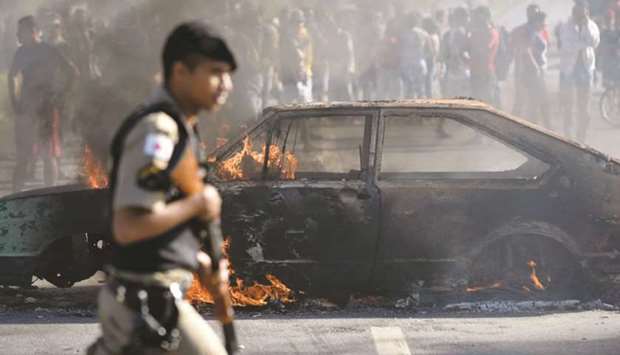Brazilian President Michel Temer yesterday ordered security forces to clear road blockades set up by truckers who pressed on with a strike that has left the vast country virtually paralysed.
The country’s economic capital of Sao Paulo has declared a state of emergency, the auto industry has shut down, gas stations have run out of fuel and flights were cancelled on the fifth day of the protest.
The truckers have attempted to put a stranglehold on movement of goods in Brazil to protest fuel price rises.
They have blocked roads in much of the vast country that has only limited rail service and where 60% of goods are transported by road.
The protest continued despite an agreement announced by the government with their representatives late Thursday to call a 15-day suspension.
Temer said he had “mobilised the security forces” to clear the roads. “We are not going to permit that the population does not have access to essential goods... that hospitals do not have the necessary medicines to save lives,” he said in a televised address.
“We accepted the 12 main demands of the truckers, who agreed to immediately end the blockades. Unfortunately, a radical minority continues to block the roads.”
The mayor of Sao Paulo also declared a state of emergency to allow city authorities to “seize private goods such as fuel, for example, that is stored in a service station.”
The strike forced the auto industry to close down, as factories were unable to receive supplies. “Assembly lines of Brazilian car manufacturers have stopped.
The truckers’ strike will affect our results significantly, including for exports,” the National Association of Motor Vehicle Manufacturers said.
The airport in Brazil’s capital Brasilia cancelled flights as it ran out of fuel.
At least five domestic flights and two international ones — to and from Miami — were cancelled, the airport said. “The airport will not close. It will continue to function, but it will only accept planes that are able to take off again without refuelling.”
Brasilia serves as a hub for connections to other airports in the vast country. Other large airports in Brazil were also threatened with fuel shortages over the strike.
Long lines have formed at gas stations in major cities since Monday as drivers sought to fill up before supplies ran out. Yesterday, many of those service stations were deserted as there was no fuel.
Wholesale markets in Rio de Janeiro were virtually empty. Temer’s chief of staff Eliseu Padilha said it would “take time” for union leaders to convince the strikers to return to work.
But the Abcam union, which represents from 700,000 truckers said “the idea is to continue the strike, the road blockades.”
“Abcam does not agree with (with the 15-day suspension) because (the government) has not kept its initial promise to cancel taxes before the end of the week,” an Abcam spokeswoman said.
The strikers are protesting increases in fuel prices — the result of a politically sensitive decision made in late 2016 to allow the state-run Petrobras oil giant autonomy over its pricing, as well as a rise in world prices in recent weeks.
But the truckers’ determination has caught Temer’s centre-right government flat-footed, five months ahead of presidential elections.

A police officer walks past a car set on fire by demonstrators, as they protest against fuel prices in San Marino neighbourhood, Ribeirao das Neves, metropolitan area of Belo Horizonte, Brazil, yesterday.
